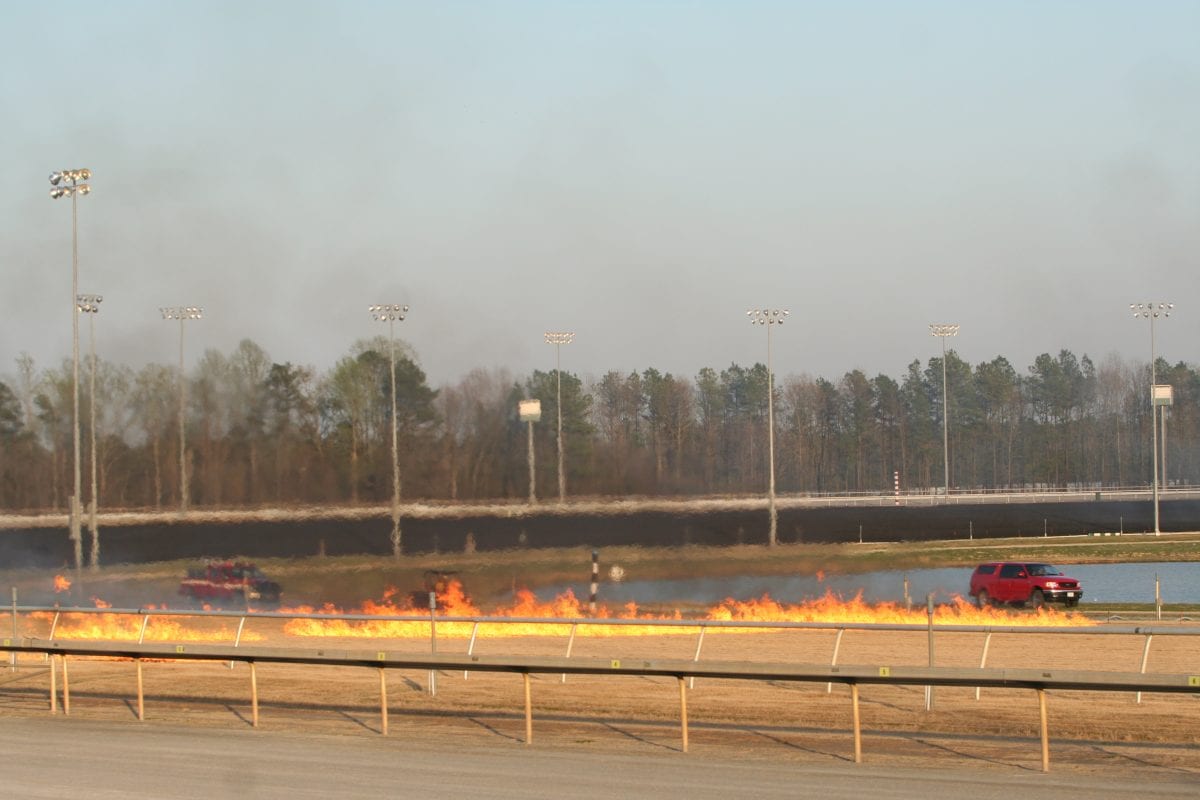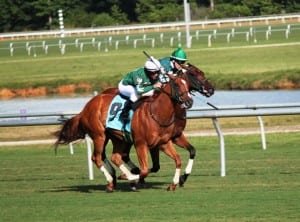by Nick Hahn
One of the coldest Virginia winters in decades has left racing leaders in Virginia in a bad mood and made an impact on the 2014 meet at Colonial Downs in a developing dispute.
It might even make you long for one of those sweltering Colonial summer days.
“It has done nothing to help the cause,” acknowledged Virginia Racing Commission executive director Bernie Hettel about the frosty January.
Hettel has been working to resolve the dispute and hosted at least three recent meetings seeking common ground between the Virginia Horsemen’s Benevolent and Protective Association (VHPBA), which represents Virginia horsemen, and Colonial Downs, Virginia’s sole flat track operator and sole holder of a so-called “unlimited license,” allowing it to operate off-track betting facilities and to host a meet longer than 14 days.
The difference of opinion has left horseplayers without Thoroughbred signals in at least of portion of the off-track betting network across Virginia. Four OTBs have closed for the duration of the dispute in Virginia (Vinton, Alberta, Martinsville and Scott County), while four others remain open (Richmond, Hampton, Chesapeake and West Richmond-Hurley’s).
There appears to be some difference in opinion on whether and how long Colonial can accept Thoroughbred wagers in the open OTBs.
“Without a contract, Colonial has to shut down,” cited Hettel about the Thoroughbred signals in the OTBs.
As of Monday morning, however, Colonial President Ian Stewart reported that the open OTBs are continuing to take wagers on Thoroughbred racing.
At issue are the format of the upcoming 2014 meet and the cost of lengthening the meet past the five weeks that the Virginia Racing Commission adopted in a December meeting.
“The Commission has come to decisions we didn’t agree with but we complied,” said Stewart. “The horsemen don’t want to accept it and want to force a different solution.”
With the horsemen-racetrack agreement originally set to expire at the end of the 2013 calendar year, the horsemen agreed to extend their contract with Colonial through the first commission meeting of 2014, set for January 21. Severe cold and the threat of snow forced the Commonwealth to close state offices, delaying the meeting until January 29. That meeting, too, was postponed for inclement weather.
Seeking to modify a Commission-approved meet format of five days of racing per week with a meet duration of five weeks, the horsemen now appear to have had enough of both Mother Nature and Colonial Downs.
The dispute appears to center on the $300,000 to $500,000 that extending the meet from five weeks to the horsemen’s preferred length of eight weeks would cost. Those costs, typically paid by track operators, include items such as jockey insurance, manure removal, stall rents, ambulance costs, advertising, even the cost of printing racing programs.
Colonial maintains that, if the horsemen want a longer meet, they should pick up the added expenses. The horsemen, for their part, believe that they should not be forced to pay for expenses typically within the purview of the track.
“When parties reach an impasse, parties are left to their economic resources,” noted HBPA Executive Director Frank Petramalo of the horsemen’s position.
“It’s unfortunate that it’s come to this, but we can do only what we can do,” said Stewart.
[pullquote]“Restricting content hurts the VHBPA, but it hurts Colonial more. Every horsemen’s group in the country has an interest in what’s happening in Virginia.” — HBPA director Frank Petramalo[/pullquote]The horsemen, at least, believe Colonial Downs is willing to run in a revised format of eight weeks with 3 racing days per week, but not without those expenses being covered by the horsemen.
A decade ago, the horsemen and racetrack worked together to expand the state’s OTB network, with the horsemen reducing their share of wagering commissions to aid in OTB construction. That led the network to grow from four facilities to 10 and facilitated the lengthening of the Colonial meet, to as many as 45 days, prior to the economic downturn in 2008.
There are currently 8 OTBs in Virginia, but they have been losing popularity to advance deposit wagering (ADW). Many of the operating OTBs have seen their annual handle fall by 50 percent or more in recent years, according to Racing Commission reports, while advance deposit wagering, which essentially did not exist in Virginia a decade ago, accounted for over 40 percent of handle in the state in 2012.
Advance deposit wagering in Virginia is not directly affected by the lack of a contract but could be impacted by horsemen in other states. Petramalo may rely on his horsemen brethren as play a role and said that it’s “not unlikely” for horsemen in other states to start shutting off signals into Virginia.
“It could impact how much signal comes back into the state,” observed Hettel.
The ADWs that generate purse money but do not add to Colonial’s revenue stream — Xpressbet, TVG and Twin Spires — would likely not be impacted. EZ Horseplay, an ADW operated by Colonial Downs to which the VHPBA is a partner, may not enjoy the same immunity, even at the horsemen’s expense.
“Restricting content hurts the VHBPA, but it hurts Colonial more,” commented Petramalo. “Every horsemen’s group in the country has an interest in what’s happening in Virginia.”
Making logistics worse is a pending previously planned trip for Petramalo who will be out of the country for several weeks but plans to keep his IPad handy.
Colonial is set to perform its annual burning of it signature turf course on April 11 prior to the scheduled start of the summer meet on June 7. Perhaps moods will be warmer by then.









I really wish these guys would get their act together and come to some agreement. Neither side seems to “get” the impact this all has on the fans.
tricky site to navigate
have some very good ideas for the adws
Thanks for checking in Peter – curious as to what you find tricky about it, so we can rectify any issues. Thanks.